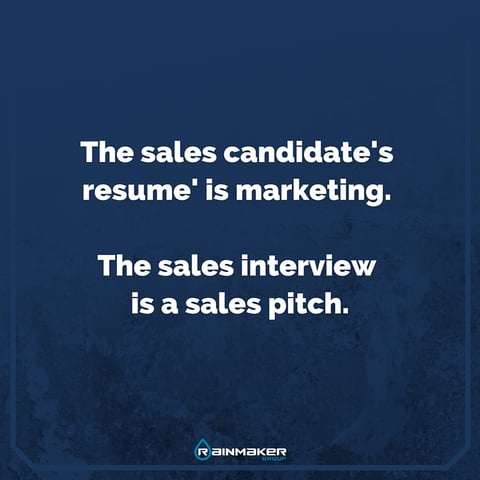A typical financial investment prospectus will contain the following warning.
Past performance does not necessarily translate into future performance.
The message is clear. Be discerning. Do your own homework.

Salespeople should come with a similar warning. I have hired a number of salespeople in my career and advised many Clients over the past 20 years. Some worked out well. Some were complete bombs.
All had what appeared to be solid resumes.
This is an important reference post that you will want to print, share, and incorporate into your sales hiring process.
Many salespeople are "successful" through no particular fault of their own.
It never ceases to amaze me how much weight and credibility is often given to a sales candidate's resume' during the hiring process. Despite the availability of valid sales personality & aptitude testing, many hiring managers and people in HR still naively or egotistically believe they can consistently hire top sales talent through the resume' and interview process alone.
The fact is the sales candidate's resume' is a marketing piece that serves them far more than you. Few salespeople truly measure up to the hype and promise reflected in their resume'.
The seven essential questions you must ask regarding each sales candidate's true sales potential.
You are reviewing the resume' of a sales candidate. This particular candidate looks more promising than others. You "creeped" them on LinkedIn. Their past sales experience looks compelling. The burning question is, "Can this candidate be successful with your company?".
To answer this question, you must ensure the smoke and mirrors of the candidate's resume' do not mislead you regarding the hoped for potential that may never be realized. To better understand a sales candidate's full potential, you must ask yourself the following questions regarding prior sales role(s).
- Strong Branding - Did the product / service / brand reputation actually do most or all of the selling?
- Intense Belief - Was prior sales success a result of intense belief in the business, the industry, brand, product / service and / or ultimately the leadership?
- The Management Golden Child - Was prior sales success due to being a management favorite?
- Lack of Prior Role Congruency - Are prior sales role(s) materially different than that you are hiring for?
- Luck - Was luck more of a contributing factor than sales ability?
- Adapted sales performer - Is your sales candidate's past sales success due to being an adapted sales performer?
- Last Person Standing - Did longevity enable the sales candidate to cherry pick good accounts as previous coworkers left?
Let's look at each in more detail.

Did the product / service / brand reputation actually do most or all of the selling?
Consider your favorite beverage. Did a salesperson sell it to you or did they take your order? You ask for it by name like I do.
Consider the last car you purchased. A salesperson likely took your order.
All salespeople seek credit for what they supposedly sold.
The key question you must know the answer to - Is your product / service / brand reputation on par with prior employers of your sales candidate? If not, will the sales candidate be able to make up the difference through pure sales ability?
Was prior sales success a result of intense belief in the business, the industry, brand, product / service and / or ultimately the leadership?
You are excited! A sales candidate from a competitor looks like an amazing catch. Growing up, the candidate's father came home every day speaking warmly about his coworkers and employer. At a young age, the sales candidate aspired to become a salesperson just like his father for the very same company and eventually did so.
Then the company father and son work for was acquired and the sales candidate kept his job and he feels his father was unfairly forced out.
In all actuality the sales candidate was not particularly strong in sales. His Job Fit is not particularly high. It was actually intense belief that helped fuel his sales and because he no longer believes, his performance suffered. Now he is seeking a new sales career with you. On paper this candidate looks quite promising. Yet this candidate does not have intense belief in your company.
Provide me two sales candidates to choose from - one with intense belief in a prior company and average sales ability and the other with amazing sales ability. I will almost always choose the sales candidate with amazing sales ability. Why? Because the risk is reduced.
I would LOVE to consider the sales candidate with past-demonstrated intense belief and average sales ability but it is simply too risky. There is the chance that this candidate will not believe in your company enough to overcome reduced Job Fit. This sales candidate could be an amazing hire or the hire from hell. Unfortunately, there is no definitive way to know if a particular sales candidate will intensely believe in your business, industry, brand, product / service and / or ultimately leadership.

Was prior sales success due to being a management golden child?
Every sales team has a golden child or two or three. These favored salespeople get breaks, extra love, and extra help from their sales managers. A golden child will often get better leads, territories, attention and as a result, their sales performance is sometimes significantly better than it would otherwise be.
"I was a golden child salesperson at XYZ Company," said no resume' ever.
The question you have to ask yourself is, "If I pull this sales candidate out of a sales role they are currently successful in, will their sales performance plummit because I am not willing to make them my golden child?".
Despite the same job title, was this sales candidate's prior role materially different from the one they seek with you?
The same sales title can have a slight to moderate to significant difference in meaning depending upon employer.
Never assume that the title a sales candidate has or has had carries the same meaning as the sales role you are hiring for. Confirm role congruency by reviewing the Key Accountabilities of prior sales roles with the sales candidate. Compare the Key Accountabilities of each prior sales role to the sales role you are considering the candidate for.
For example, I like to ask a sales candidate how they obtained leads and what prospecting looked like in order to understand the type of core Behavioral Style the prior sales role may have required.
Was the sales candidate lucky?
Some salespeople get lucky. They are in the right place at the right time through no fault of their own and then bam! A huge sales opportunity lands in their lap. As is most often the case, guilt by association makes an otherwise low performer look like a sales genius on paper.
A good example would be a food service rep in a territory where a casino or hospital opens.
I like to identify prior sales luck by reviewing the top five to ten accounts a sales candidate had in each prior sales role. The key is to understand how each Customer was acquired (or not) by the sales candidate as well as the percentage of total business each represented in their portfolio. I also like to review specifically how the sales candidate increased the business of each of their top Customers over time.
Is prior sales success due to being an adapted sales performer?
There are times in one's life where we are particularly driven to earn an income that is perhaps above our normal desire or usual capacity to do so. Examples include saving for college or a home purchase, paying off a debt or vacation. These needs can be temporary or long-term in need. A single parent or single income earner may have a long-term need to earn enough income cover living expenses for their family.
During these times salespeople adapt their Behaviors to sometimes become more aggressive and / or focused than they might otherwise be.
Once the perceived need goes away, most salespeople will return to their normal Behavior. As a result, sales performance often suffers.
No, you cannot ask interview questions of this nature. It is morally wrong and doing so may expose you to legal liability.
Was your sales candidate the last salesperson standing?
The universal law of the best salespeople is they eventually seek to improve themselves through other opportunities. Your best salespeople may seek greener pastures on their own or they are head-hunted away.
Who is often left behind? That's right - the order-takers.
The order-takers remain behind and they often sift through the accounts of salespeople who resign. This practice is often part of the code of conduct in the sales team. In fact, the more senior order-takers often have first dibs.
The result is the order-takers organically expand their book of business with little effort on their part. As their book of business organically expands, these order-takers write resume's with books of business that seem larger than they really were.
I use the following questions to identify these people.
- "Tell me about your top five to ten accounts."
- "How did you acquire them?"
- "How did you grow them?"
- "How much did each grow?"
The real question you must know the answer to is, "What is the sales candidate's true sales ability?"
What you see in a resume' is marketing. The sales interview is a sales pitch. The danger is you see something you really like, put too much emphasis on it, ignore the signs by not asking the hard questions previously-described and your reputation suffers accordingly.
I have been hiring salespeople for pushing 20 years. My ego says, "I know sales talent. I know good salespeople when I see them."
But then my wallet would enter the debate and win because it knows the price of a bad sales hire.
The only way to objectively know the true sales ability of a sales candidate is to identify the Key Accountabilities of a particular sales role and then assess every single sales candidate to identify Job Fit.
Review the potential risk areas I have shared in this article but then verify what you think you see with a multi-science sales personality test. When effectively used, a multi-science sales personality test is going to be the only objective information you have about your sales candidate.




